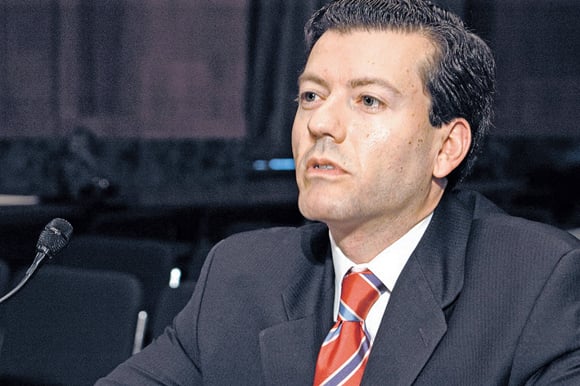The executive director of the largest retirement plan adviser trade group on Sunday equated the Labor Department's new “fiduciary” rule to an infant that “pees you in the face,” joining a large chorus of observers citing the complexity of the new regulation and the massive shake-up it will have on the industry.
Waiting for the Department of Labor to release its rule that will raise investment advice standards for retirement accounts was like awaiting the birth of a child, which then proceeds to keep a parent up all night, Brian Graff, executive director of the National Association of Plan Advisors, said at the trade group's 15th annual 401(k) Summit.
“Like a baby, it keeps you up at night, because … I'm thinking about it all the time, waking up in the middle of the night, asking what's it saying,” according to Mr. Graff. He continued to say the rule is similar to changing a child's diaper, especially that of a boy who urinates on a parent in the process.
“When I look at this reg every once in a while, I feel like, yeah, I'm getting peed in the face,” Mr. Graff said.
(Related read: The DOL Fiduciary rule from all angles)
Although the Labor Department made some concessions to the industry in its rule released in final form April 6, the regulation fundamentally changes the way advisers can do business, especially in rollover and plan-education situations, Mr. Graff said.
The DOL's fiduciary rule, as one can imagine given its potential impact and newness, is the hot topic at the NAPA conference. Others industry practitioners such as Bradford Campbell, counsel at Drinker Biddle & Reath, seemed to share Mr. Graff's opinion.
“There's no question that the rule is significantly distorting the marketplace from what it was,” said Mr. Campbell, former head of the Employee Benefits Security Administration.
The DOL yielded on a few contentious points of its rule, including the streamlining of disclosures, for example, which transformed it from something that didn't work at all to one that does but will cost a lot to comply with, Mr. Campbell said. The disclosures, for example, have “gone from impossible to painful," he added.
The rule “is better, but that doesn't mean it's going to be better or useful for you,” Mr. Campbell said during a full-house presentation on an aspect of the rule known as the Best Interest Contract Exemption. “This is not a huge victory,” despite a few “definite improvements.”
He rebuffed the notion that the DOL watered down the regulation too much, so that it no longer has the same teeth it did in its proposed form.
Regardless of how stakeholders feel about the substance of the DOL's ultimate rule, the “physical and mental work” that went into making “pretty substantive changes that were meaningful” in the year following the rule's proposal is impressive, Mr. Graff said at a press conference following his keynote speech.
Although the likelihood is high there will be a lawsuit filed to block the rule, advisers should operate as if the rule will be the law of the land, Mr. Graff said.
“I know some people want to put the baby up for adoption. Those are the folks who'll file a lawsuit on the rule, and it's going to happen … but we're operating on the assumption we're keeping the baby and we're going to have to deal with this thing,” Mr. Graff said.







